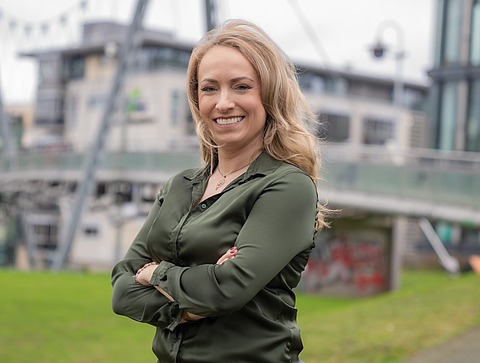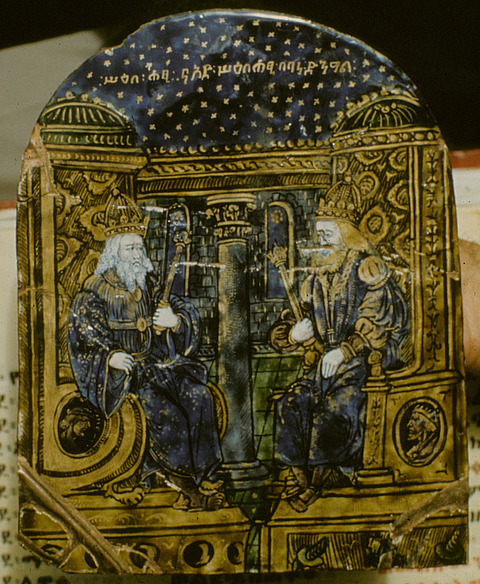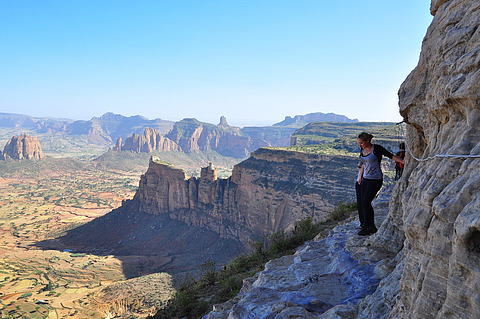Q&A with Verena Krebs

Verena Krebs is a medieval historian working on Christian Ethiopia and the Horn of Africa, who draws on archaeology, art, and written sources for her scholarship. Following the publication of her first book, Medieval Ethiopian Kingship, Craft, and Diplomacy with Latin Europe (Palgrave Macmillan, 2021), she was awarded a 2022 David Dan Prize for “overturning traditional narratives of African-European relations and cultural exchange, and painting a vivid picture of the role of art, artisans and relics in state-building and diplomacy in medieval Ethiopia”.
At IAS, Krebs will work on her second monograph, “Africa Collecting Europe: Patronage and Power in Christian Ethiopia, 1468–1530”, which centers long-neglected material culture sources from Christian Ethiopia to tease out an untold story about the assertion of power in a pre-colonial African kingdom.
How do you describe your work to friends and family?
I tend to say that I look at how people in the medieval past encountered one another over very long distances, and how they thought about the world they lived in, and their place in that same world.
What is one way you would like to impact your field?
I’d be very happy if my research could help broaden the (geographic) scope of medieval history, reassess commonly held paradigms about European-African interactions, and push people to re-think the importance of African polities in a larger pre-modern world.

What motivates you as a researcher?
Trying to figure out the many (often very surprising, and rather marvelous!) ways in which the pre-modern world was interconnected. So many things seem inexplicable at first glance — like this one small painted enamel found in a now-remote monastery in the Ethiopian province of Gojjam. It was made in early 16th-century France, yet there’s writing on it in the old Ethiopian literary and liturgical language of Ge’ez. Its rather wonky letters indicate that the inscription was painted in Europe by a Latin Christian artisan who did not know what they were writing. How and why did this enamel come to be made? Who commissioned it, and for what purpose was it brought to early 16th-century Christian Ethiopia? Turns out there’s a larger story of courtly intrigue, and a queen mother’s attempt to get her young son on the throne all hiding behind the history of this one small object. It opens up a whole world, if we care to look.
Where is your favorite place to think?
I do my best thinking on long hikes in the remote German countryside … in moments when I’m actively trying not to think. By a quirk of fate, I wrote both my big research projects in a rural village, staying at my parents’ house at the edge of a low forest mountain range — first to save money when I ran out of funding the last year of my Ph.D., and then again when I wrote my first book from scratch during the Covid lockdowns of spring and summer 2020.
Why IAS?
From everything I’ve heard, the IAS offers a peaceful place to work and wonderful opportunities to interact with other scholars. Also, I’ve never had a sabbatical, and I’ve never spent much time in the U.S., so I’m quite excited about both.
What other activities or pastimes do you enjoy?
Hiking, running, kickboxing — anything that forces me to clear my mind, really. I also really love cooking, and I am a huge sci-fi and fantasy nerd.
What is your favorite part about your career and work?
That it gives me the freedom to pursue something I’m truly excited and passionate about — and that it has enabled me to travel far and wide, forming lasting connections with friends and colleagues in places far from where I grew up. I’m the first in my family to attend high school (not to even speak of obtaining any further education!), so I’m constantly reminded that this work, this career, and the rather mind-blowing fact I’m paid to think, read, write, or travel — it’s just an immense privilege.
